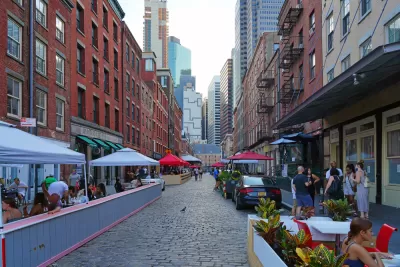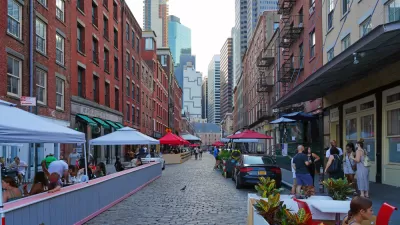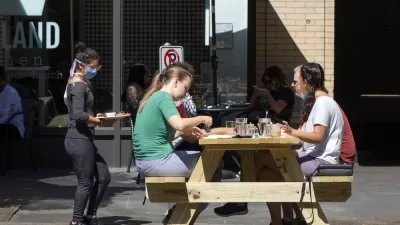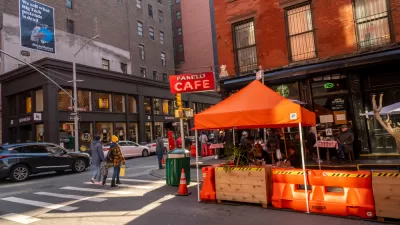Many cities like New York have reallocated space formerly reserved for moving and storing cars to help restaurants and stores weather the pandemic, but as more residents rely on cars for the same reason, the dynamic threatens to boil over.

Doree Lewak found some New Yorkers upset about the conversion of parking spots to outdoor dining areas—a common signifier of life during the pandemic in cities of all sizes and geographic location around the country.
According to Lewak, the tension is the result of two conflicting forces:
According to the Department of Transportation’s Brian Zumhagen, the expansion of outdoor dining has eliminated as many as 10,000 parking spots on commercial corridors. At the same time, COVID-19 lockdown has spurred more New Yorkers to purchase their first cars.
Lewak's star witness is Upper West Side resident Melanie Wesslock, who says parking hassle is at an all-time high in Manhattan.
The Upper West Side married mom of one grudgingly abandons her street space each weekday morning to drive her son to school on the Lower East Side rather than risk the high school freshman catching the coronavirus on public transit.
“On average, it takes four hours per day due to limited alternate parking rules and curbside dining taking spots,” the photographer griped to The Post from the front seat of her red Mini Countryman. “I think the only conversations we have now are about parking. It’s dominating my life right now.”
While car owners find a media outlet to sympathize with their plight, the city has taken recent steps to ensure that business and social activity will continue to take precedence over car-centric uses. The city of New York made its outdoor dining program, a long shot not that long ago, permanent in the city.
The news about parking conflicts arising in response to New York's outdoor dining program stands in contrast to reports from around the country about a surprising lack of parking controversies as outdoor dining programs have proliferated around the country during the pandemic. Even where outdoor dining has won in the court of public opinion, the threat of dangerous drivers still hangs over the scene in these new commercial and social spaces.
FULL STORY: NYC street parking hell is worse than ever due to COVID-19 drama

Planetizen Federal Action Tracker
A weekly monitor of how Trump’s orders and actions are impacting planners and planning in America.

Congressman Proposes Bill to Rename DC Metro “Trump Train”
The Make Autorail Great Again Act would withhold federal funding to the system until the Washington Metropolitan Area Transit Authority (WMATA), rebrands as the Washington Metropolitan Authority for Greater Access (WMAGA).

The Simple Legislative Tool Transforming Vacant Downtowns
In California, Michigan and Georgia, an easy win is bringing dollars — and delight — back to city centers.

The States Losing Rural Delivery Rooms at an Alarming Pace
In some states, as few as 9% of rural hospitals still deliver babies. As a result, rising pre-term births, no adequate pre-term care and harrowing close calls are a growing reality.

The Small South Asian Republic Going all in on EVs
Thanks to one simple policy change less than five years ago, 65% of new cars in this Himalayan country are now electric.

DC Backpedals on Bike Lane Protection, Swaps Barriers for Paint
Citing aesthetic concerns, the city is removing the concrete barriers and flexposts that once separated Arizona Avenue cyclists from motor vehicles.
Urban Design for Planners 1: Software Tools
This six-course series explores essential urban design concepts using open source software and equips planners with the tools they need to participate fully in the urban design process.
Planning for Universal Design
Learn the tools for implementing Universal Design in planning regulations.
Smith Gee Studio
City of Charlotte
City of Camden Redevelopment Agency
City of Astoria
Transportation Research & Education Center (TREC) at Portland State University
US High Speed Rail Association
City of Camden Redevelopment Agency
Municipality of Princeton (NJ)





























